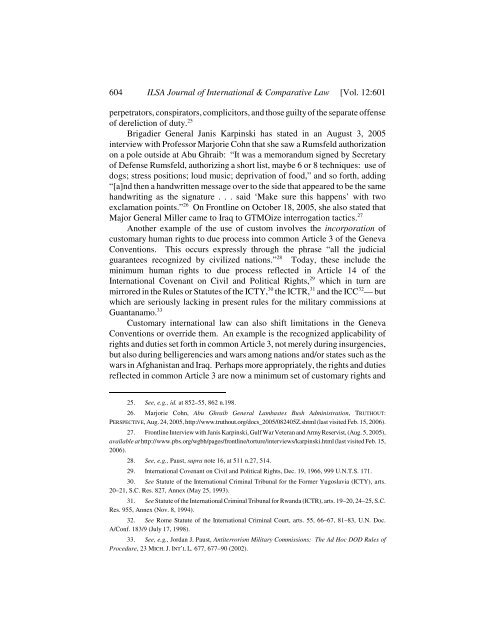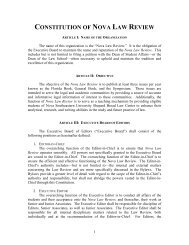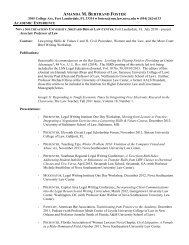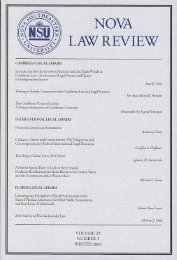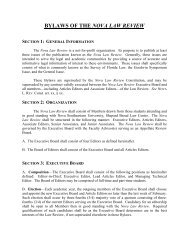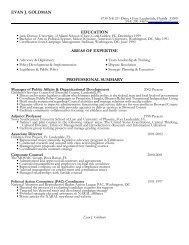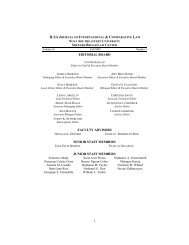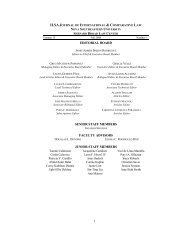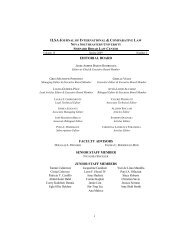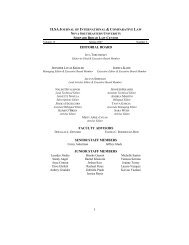604 ILSA Journal of International & Comparative <strong>Law</strong> [Vol. <strong>12</strong>:601perpetrators, conspirators, complicitors, and those guilty of the separate offenseof dereliction of duty. 25Brigadier General Janis Karpinski has stated in an August 3, 2005interview with Professor Marjorie Cohn that she saw a Rumsfeld authorizationon a pole outside at Abu Ghraib: “It was a memorandum signed by Secretaryof Defense Rumsfeld, authorizing a short list, maybe 6 or 8 techniques: use ofdogs; stress positions; loud music; deprivation of food,” and so forth, adding“[a]nd then a handwritten message over to the side that appeared to be the samehandwriting as the signature . . . said ‘Make sure this happens’ with twoexclamation points.” 26 On Frontline on October 18, 2005, she also stated thatMajor General Miller came to Iraq to GTMOize interrogation tactics. 27Another example of the use of custom involves the incorporation ofcustomary human rights to due process into common Article 3 of the GenevaConventions. This occurs expressly through the phrase “all the judicialguarantees recognized by civilized nations.” 28 Today, these include theminimum human rights to due process reflected in Article 14 of theInternational Covenant on Civil and Political Rights, 29 which in turn aremirrored in the Rules or Statutes of the ICTY, 30 the ICTR, 31 and the ICC 32 — butwhich are seriously lacking in present rules for the military commissions atGuantanamo. 33Customary international law can also shift limitations in the GenevaConventions or override them. An example is the recognized applicability ofrights and duties set forth in common Article 3, not merely during insurgencies,but also during belligerencies and wars among nations and/or states such as thewars in Afghanistan and Iraq. Perhaps more appropriately, the rights and dutiesreflected in common Article 3 are now a minimum set of customary rights and25. See, e.g., id. at 852–55, 862 n.198.26. Marjorie Cohn, Abu Ghraib General Lambastes Bush Administration, TRUTHOUT:PERSPECTIVE, Aug. 24, 2005, http://www.truthout.org/docs_2005/082405Z.shtml (last visited Feb. 15, 2006).27. Frontline Interview with Janis Karpinski, Gulf War Veteran and Army Reservist, (Aug. 5, 2005),available at http://www.pbs.org/wgbh/pages/frontline/torture/interviews/karpinski.html (last visited Feb. 15,2006).28. See, e.g., Paust, supra note 16, at 511 n.27, 514.29. International Covenant on Civil and Political Rights, Dec. 19, 1966, 999 U.N.T.S. 171.30. See Statute of the International Criminal Tribunal for the Former Yugoslavia (ICTY), arts.20–21, S.C. Res. 827, Annex (May 25, 1993).31. See Statute of the International Criminal Tribunal for Rwanda (ICTR), arts. 19–20, 24–25, S.C.Res. 955, Annex (Nov. 8, 1994).32. See Rome Statute of the International Criminal Court, arts. 55, 66–67, 81–83, U.N. Doc.A/Conf. 183/9 (July 17, 1998).33. See, e.g., Jordan J. Paust, Antiterrorism Military Commissions: The Ad Hoc DOD Rules ofProcedure, 23 MICH. J. INT’L L. 677, 677–90 (2002).
2006] Paust 605duties that are also applicable in international armed conflicts. 34 Moreover,customary and universally applicable human rights apply during war andprovide at least the same or similar rights and restraints. 35Another area of customary law is worth highlighting—the immunity ofcombatants from prosecution for conduct that is lawful under the customarylaws of war. 36 Interrelated is the customary definition of “combatant,” whichhinges on membership in the armed forces of a belligerent, nation, or stateduring an armed conflict. 37 Attempts to change that test can be dangerous forU.S. and other military personnel. 38 Of course, mere insurgents have nocombatant status or combatant immunity under customary law. 39Customary international law can also have effects domestically. 40 Forexample, when a treaty is not directly incorporable but the customary laws ofwar can be, customary laws of war can produce direct effects in a domesticlegal process. 41 In the United States, the customary laws of war are binding onthe President and all persons within the Executive branch. 42 There have alsobeen recognitions of the primacy of the laws of war over federal statutes. 4334. See, e.g., Paust, supra note 3, at 816–17 n.19.35. See, e.g., id. at 820–22. Under the U.N. Charter, human rights would also prevail overinconsistent law of war treaties. See U.N. Charter arts. 55(c), 56, 103. Human rights jus cogens would alsoprevail over more ordinary international law.36. See, e.g., Jordan J. Paust, War and Enemy Status After 9/11: Attacks on the <strong>Law</strong>s of War, 28YALE J. INT’L L. 325, 330–33 (2003).37. Id. at 328–330.38. See, e.g., id. at 332–35.39. Id. at 327–29.40. See, e.g., PAUST, supra note 1, at 7–16.41. See, e.g., id. at 10–<strong>12</strong>, 15, 170–73, 293–96 n.503, 370–71, 489, 492–94, 499–501 n.25, 507–08n.87.42. See, e.g., Paust, supra note 3, at 856, 858–61.43. See, e.g., PAUST, supra note 1, at 106–07.
- Page 1 and 2:
ILSA JOURNAL OF INTERNATIONAL & COM
- Page 3 and 4:
Leslie Larkin Cooney, B.S., J.D., A
- Page 5:
LIBRARY STAFFLisa Smith-Butler, B.A
- Page 8 and 9:
I am especially indebted to the Exe
- Page 10 and 11:
Filling the Void: Providing a Frame
- Page 13 and 14:
INTERNATIONAL LAW WEEKEND PANEL ONL
- Page 15 and 16:
2006] Dugot 391thousands of looted
- Page 17:
2006] Dugot 393physically examining
- Page 20 and 21:
396 ILSA Journal of International &
- Page 22 and 23:
398 ILSA Journal of International &
- Page 24 and 25:
400 ILSA Journal of International &
- Page 26 and 27:
402 ILSA Journal of International &
- Page 28 and 29:
404 ILSA Journal of International &
- Page 30 and 31:
406 ILSA Journal of International &
- Page 32 and 33:
408 ILSA Journal of International &
- Page 34 and 35:
410 ILSA Journal of International &
- Page 36 and 37:
412 ILSA Journal of International &
- Page 38 and 39:
414 ILSA Journal of International &
- Page 41 and 42:
AFTER THE HAGUE: SOME THOUGHTS ON T
- Page 43 and 44:
2006] Fairley and Archibald 419coul
- Page 45 and 46:
2006] Fairley and Archibald 421of i
- Page 47 and 48:
2006] Fairley and Archibald 423the
- Page 49 and 50:
2006] Fairley and Archibald 425init
- Page 51 and 52:
2006] Fairley and Archibald 427B. T
- Page 53 and 54:
2006] Fairley and Archibald 429Colu
- Page 55:
2006] Fairley and Archibald 431excl
- Page 58 and 59:
434 ILSA Journal of International &
- Page 60 and 61:
436 ILSA Journal of International &
- Page 62 and 63:
438 ILSA Journal of International &
- Page 64 and 65:
440 ILSA Journal of International &
- Page 66 and 67:
442 ILSA Journal of International &
- Page 68 and 69:
444 ILSA Journal of International &
- Page 70 and 71:
446 ILSA Journal of International &
- Page 72 and 73:
448 ILSA Journal of International &
- Page 74 and 75:
450 ILSA Journal of International &
- Page 76 and 77:
452 ILSA Journal of International &
- Page 78 and 79:
454 ILSA Journal of International &
- Page 80 and 81:
456 ILSA Journal of International &
- Page 83 and 84:
APPLICATION OF HUMAN RIGHTS TREATIE
- Page 85 and 86:
2006] Dennis 461recent military occ
- Page 87 and 88:
2006] Dennis 463Hence, on the basis
- Page 89 and 90:
2006] Dennis 465reading of Article
- Page 91 and 92:
2006] Dennis 467[The] grammatical (
- Page 93 and 94:
2006] Dennis 469[Lopez Burgos v. Ur
- Page 95 and 96:
2006] Dennis 471By way of example,
- Page 97 and 98:
2006] Dennis 473One important doorw
- Page 99 and 100:
2006] Dennis 475letter from the U.S
- Page 101 and 102:
2006] Dennis 477decisions at very s
- Page 103 and 104:
2006] Dennis 479to the catalog of n
- Page 105 and 106:
FILLING THE VOID: PROVIDING A FRAME
- Page 107 and 108:
2006] Corn 483international human r
- Page 109 and 110:
2006] Corn 485force regulated by su
- Page 111 and 112:
2006] Corn 487This mandate has been
- Page 113:
2006] Corn 489The military aspect o
- Page 116 and 117:
492 ILSA Journal of International &
- Page 118 and 119:
494 ILSA Journal of International &
- Page 120 and 121:
496 ILSA Journal of International &
- Page 122 and 123:
498 ILSA Journal of International &
- Page 124 and 125:
500 ILSA Journal of International &
- Page 126 and 127:
502 ILSA Journal of International &
- Page 128 and 129:
504 ILSA Journal of International &
- Page 130 and 131:
506 ILSA Journal of International &
- Page 132 and 133:
508 ILSA Journal of International &
- Page 134 and 135:
510 ILSA Journal of International &
- Page 136 and 137:
512 ILSA Journal of International &
- Page 138 and 139:
514 ILSA Journal of International &
- Page 140 and 141:
516 ILSA Journal of International &
- Page 142 and 143:
518 ILSA Journal of International &
- Page 144 and 145:
520 ILSA Journal of International &
- Page 147 and 148:
WHAT IS WAR? TERRORISM AS WAR AFTER
- Page 149 and 150:
2006] Dalton 525died in the attacks
- Page 151 and 152:
2006] Dalton 5271998, 14 though he
- Page 153 and 154:
2006] Dalton 529done so. Because of
- Page 155 and 156:
2006] Dalton 531One also hears the
- Page 157:
2006] Dalton 533Secretary of Homela
- Page 160 and 161:
536 ILSA Journal of International &
- Page 162 and 163:
538 ILSA Journal of International &
- Page 165 and 166:
“WAR” IN THE AMERICAN LEGAL SYS
- Page 167 and 168:
2006] Vagts 543conspicuously the Ko
- Page 169:
2006] Vagts 545countries and curren
- Page 172 and 173:
548 ILSA Journal of International &
- Page 174 and 175:
550 ILSA Journal of International &
- Page 176 and 177:
552 ILSA Journal of International &
- Page 179 and 180: IS INTERNATIONAL LAW A THREAT TODEM
- Page 181 and 182: 2006] Strauss 557least to the exten
- Page 183 and 184: ON THE UNEASY RELATION BETWEENINTER
- Page 185 and 186: 2006] Gould 561waste from Canada. C
- Page 187 and 188: 2006] Gould 563Beyond this, we can
- Page 189 and 190: POLITICAL CONFLICT AND FREEDOM OFEX
- Page 191 and 192: 2006] Herrera 567“final battle”
- Page 193 and 194: HATE SPEECH UNDER THE AMERICANCONVE
- Page 195 and 196: 2006] Bertoni 5715) any imposition
- Page 197 and 198: 2006] Bertoni 573Convention says th
- Page 199 and 200: CONNECTICUT AND INTERNATIONAL LAWHo
- Page 201 and 202: 2006] Lowry 577B. UNCITRAL Model La
- Page 203 and 204: 2006] Lowry 579This subjected plain
- Page 205: 2006] Lowry 581Hong Kong first rais
- Page 208 and 209: 584 ILSA Journal of International &
- Page 210 and 211: 586 ILSA Journal of International &
- Page 212 and 213: 588 ILSA Journal of International &
- Page 214 and 215: 590 ILSA Journal of International &
- Page 217 and 218: NULCLEAR NON-PROLIFERATION AND UNIQ
- Page 219 and 220: 2006] Zlauvinen 595governments to b
- Page 221 and 222: 2006] Zlauvinen 597however, is a sp
- Page 223 and 224: 2006] Zlauvinen 599and reprocessing
- Page 225 and 226: THE IMPORTANCE OF CUSTOMARYINTERNAT
- Page 227: 2006] Paust 603whether or not perso
- Page 233: AMERICAN BAR ASSOCIATIONSECTION OF
- Page 237: INTER-AMERICAN CENTER FOR HUMAN RIG


